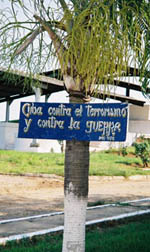 |
| Cuba Home | | |
About the Program | | |
News | | |
| |
| |
| |
| |
|
Last
Updated:3/03/10
Cuba on the U.S. List of State Sponsors of Terrorism Links to State Department Reports on the U.S. List of State Sponsors of Terrorism 2005 2004 2003 2002 2001 2000 1995-1999
CIP's Conferences, Delegations, and Publications regarding Cuba's unwarranted inclusion on the list January 28, 2010 Conference: To Examine Cuba's Inclusion on the List of Terrorist States January 2010 IPB: Cuba Should Not Be On the Terrorist List November 2004 IPR: Cuba Should Not Be On the Terrorist List October 21, 2004: Conference to Weigh the Evidence to Keep Cuba on the U.S. List of State Sponsors of Terrorism (Summary) (Photographs) (Paper by Robert Muse) (Paper by Glenn Baker) CIP Center for Defense Information (CDI) delegation: Fact-finding mission November 2002 IPR: Cuba on the Terrorist List: In Defense of the Nation or Domestic Political Calculation? History
of The US List of State Sponsors of Terrorism
Additional Reading: No evidence Cuba working on bioweapons, expert says U.S. uncertain about a Cuba weapons program Cuba signs nonproliferation treaty Is Cuba a biowar threat or not? Carter, Powell on Cuba and bioweapons "If you're of the Cuban exile variety, right here"
|
|
{body}
|
|
|
| Asia | | | Latin America Security | | | Cuba | | | National Security | | | Global Financial Integrity | | | Americas Program | | | Avoided Deforestation Partners | | | Win Without War | | | TransBorder Project |
| Center
for International Policy |
